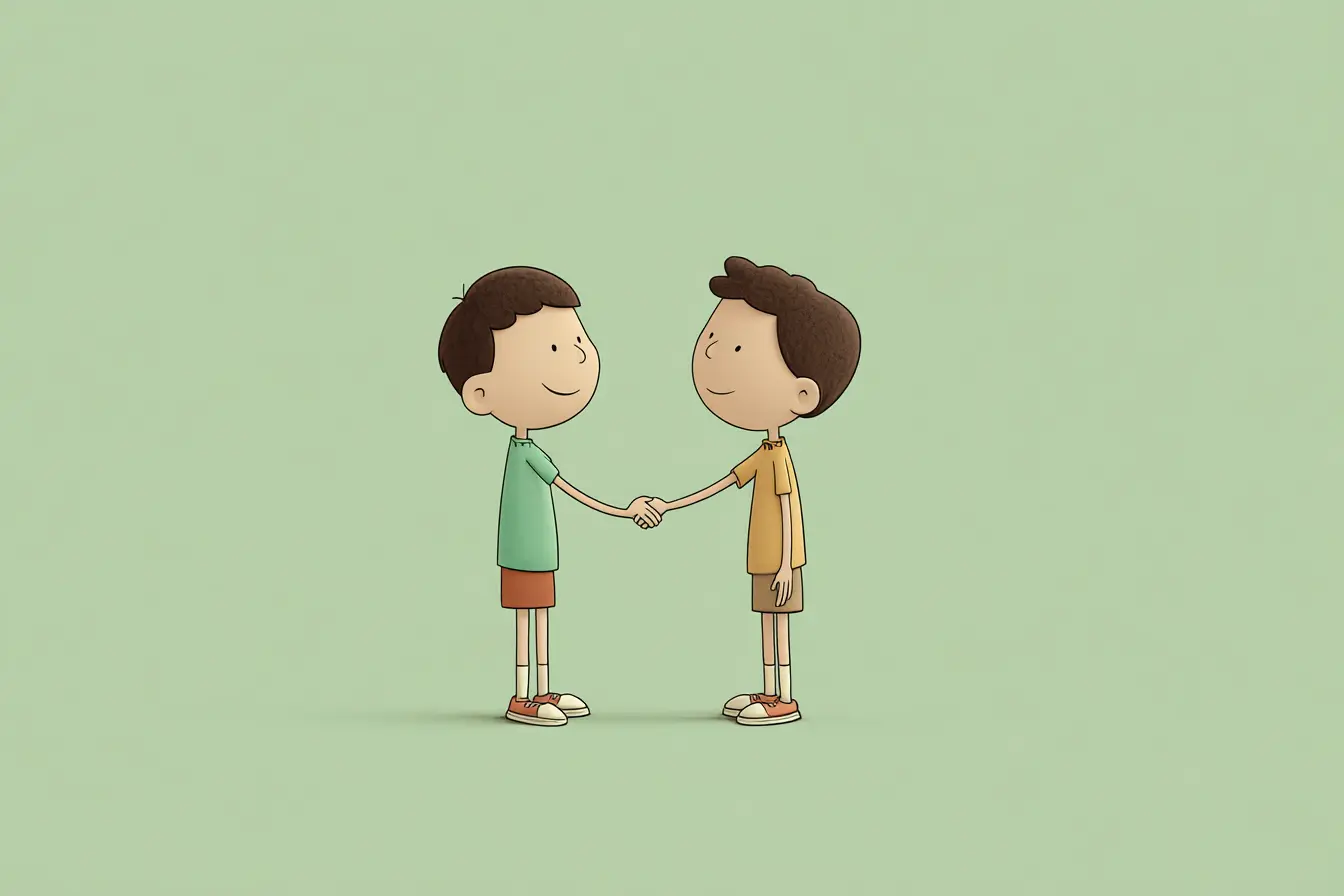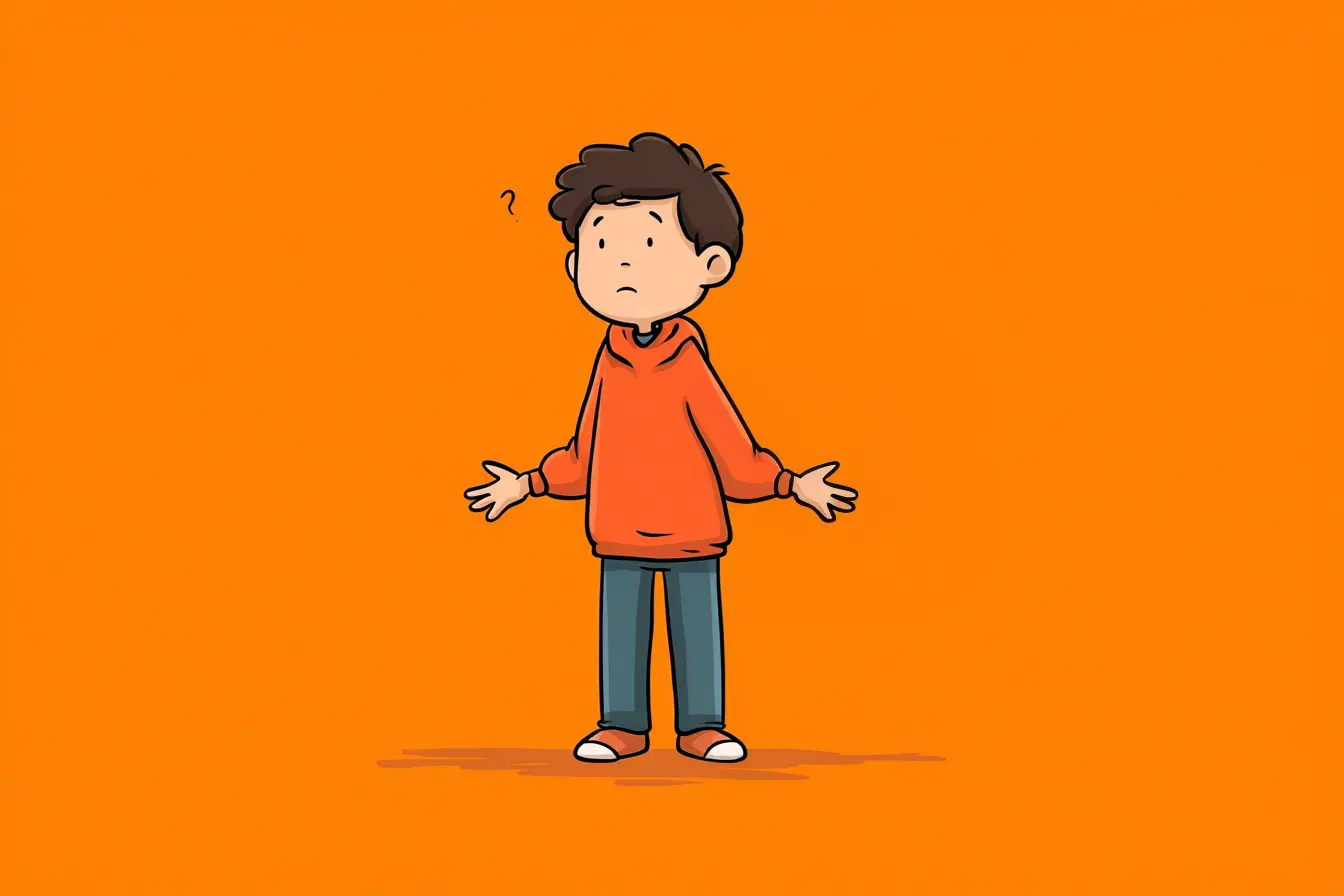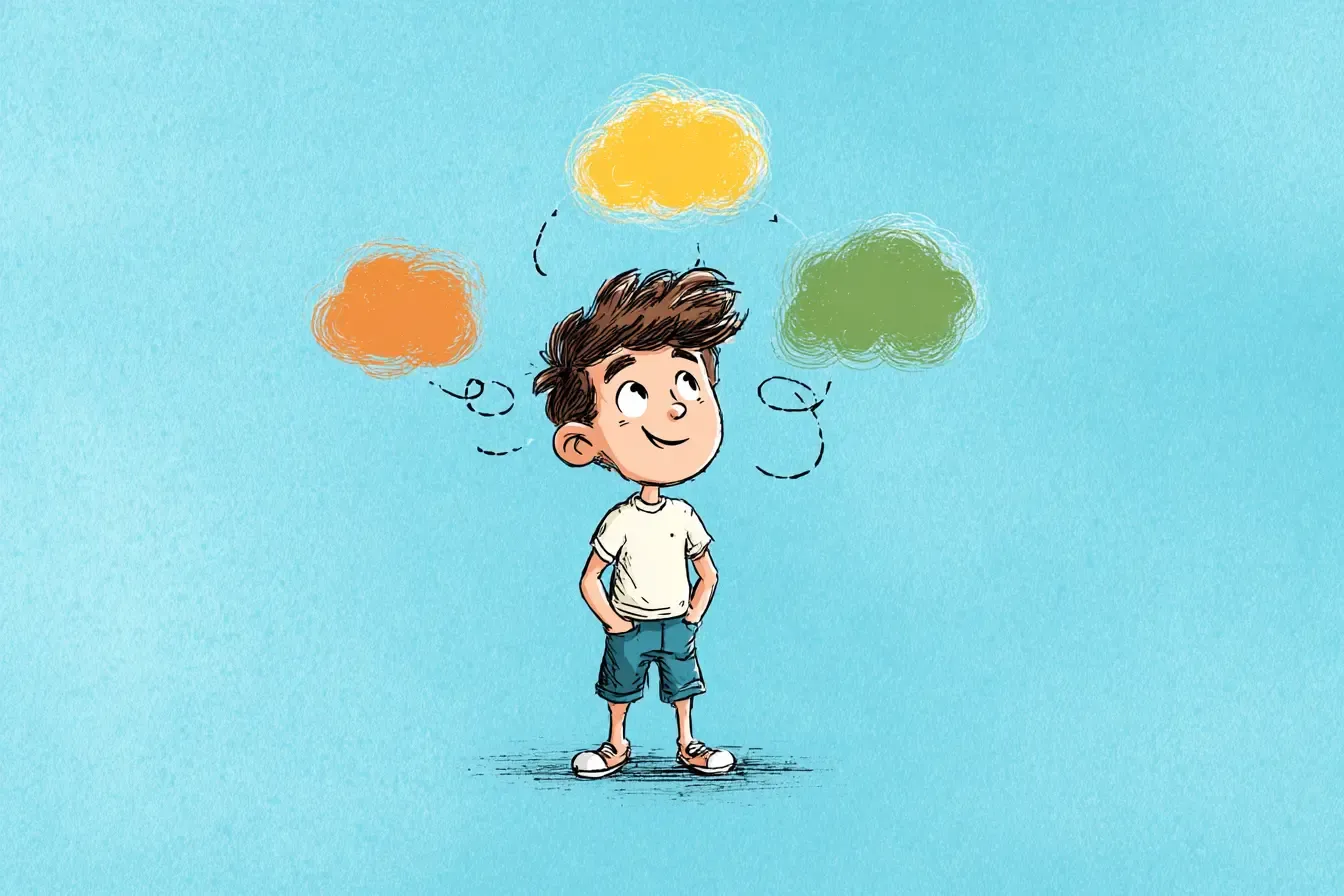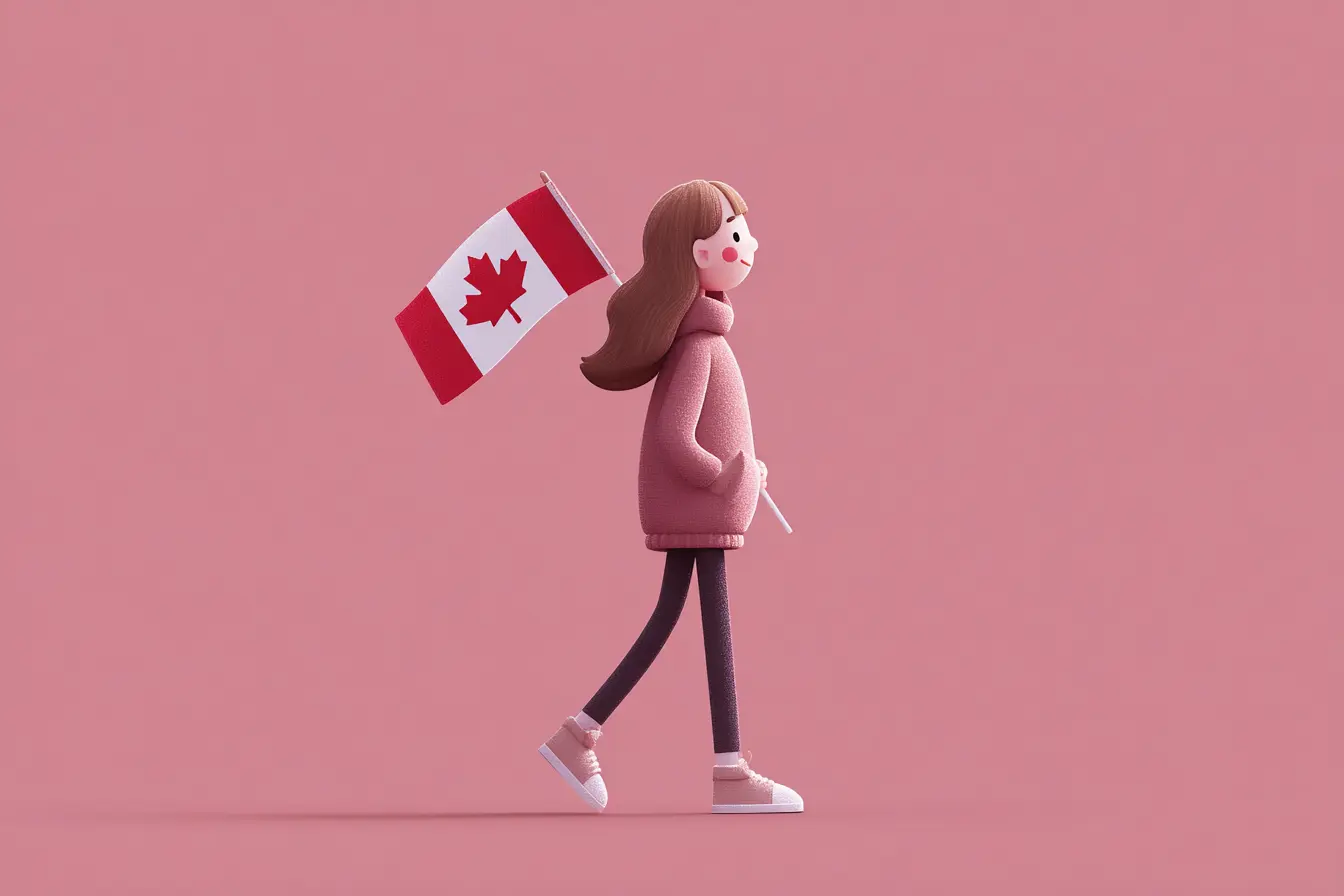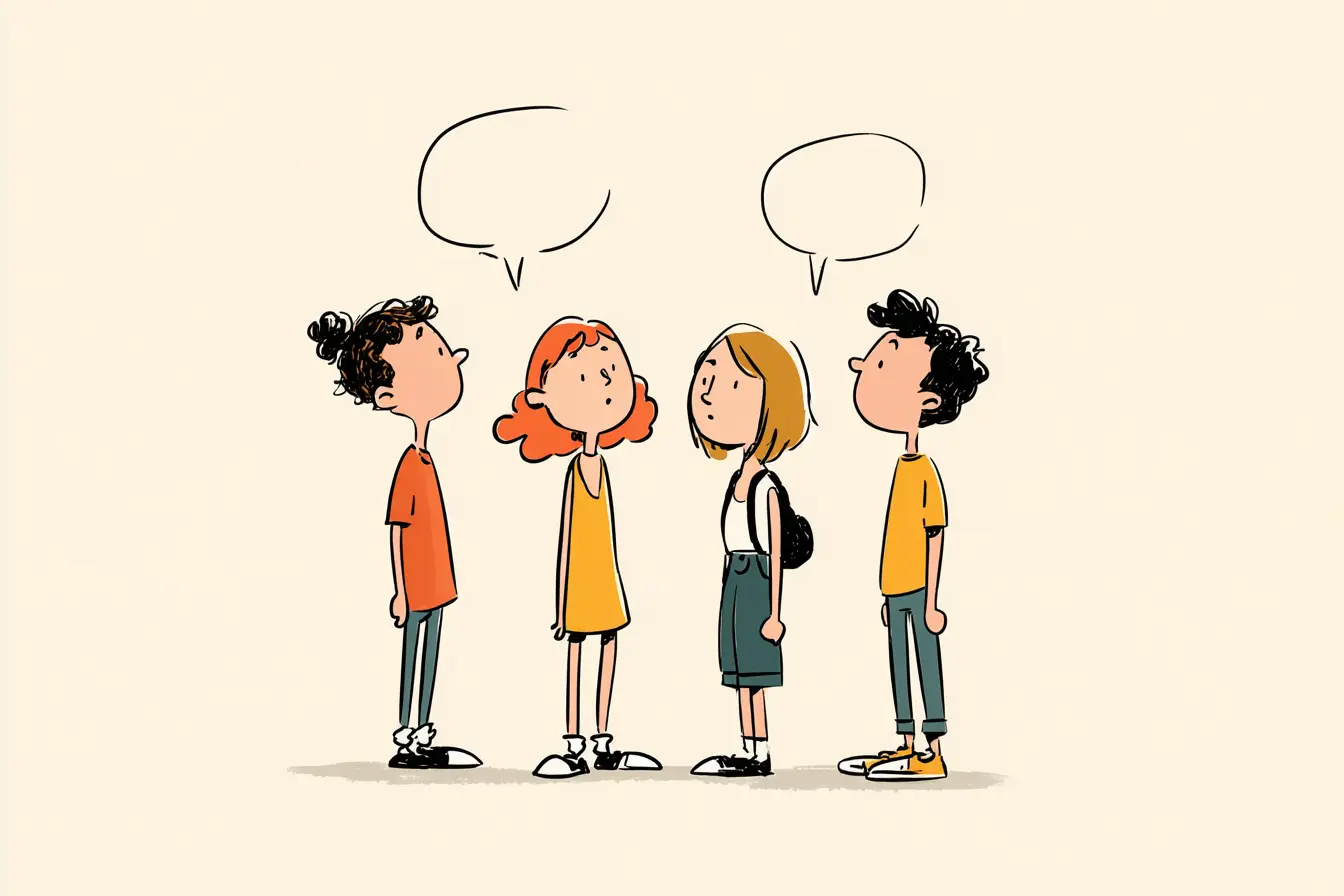Phrasal verbs are a fundamental part of English, often making learners scratch their heads. The verb "get" is one of the most versatile and frequently used in English. When combined with different prepositions or adverbs, its meaning changes significantly. Let’s dive into the world of phrasal verbs with "get" and learn how to master them!
Why are phrasal verbs important?
Phrasal verbs are commonly used in English. They make communication more natural and expressive. Mastering them can help you sound like a native speaker and understand conversations or texts more efficiently.
Quick reference: phrasal verbs with "Get"
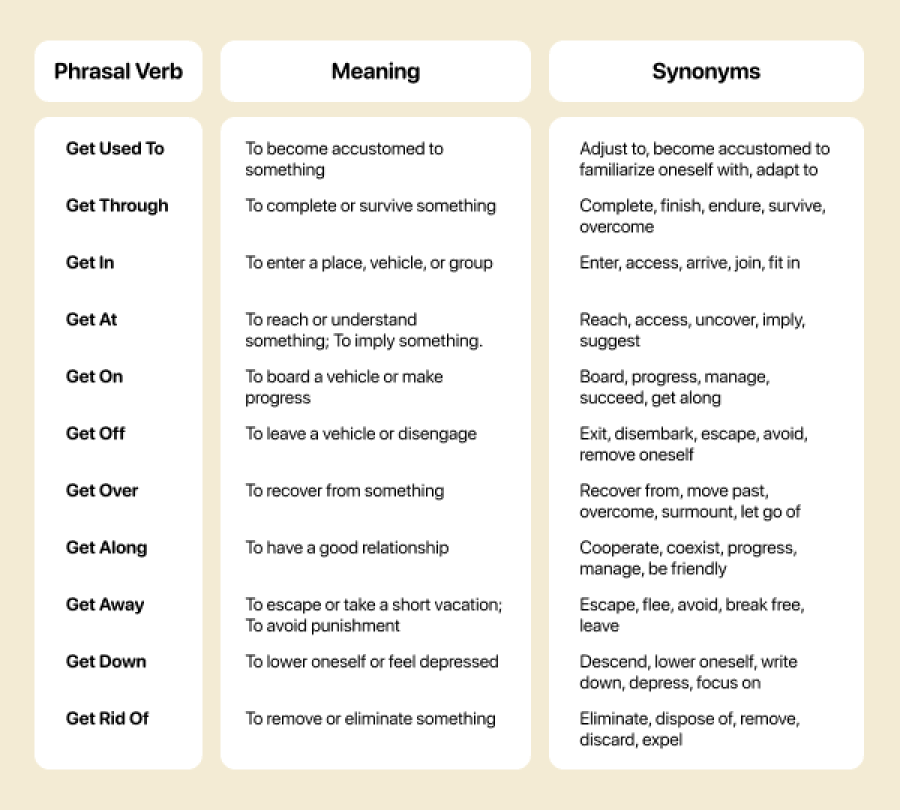
1. Get used to
Meaning: To become accustomed to something over time.
Examples:
"I never could get used to the way she spoke her mind so freely, but there was no denying her honesty."
— Louisa May Alcott, Little Women (1868)
"The young sailor found it hard to get used to the restless motion of the ship during his first voyage."
— Herman Melville, Moby-Dick (1851)
"We must get used to the idea that things may not always be as they seem."
— Jane Austen, Pride and Prejudice (1813)
Tip: This phrasal verb is often followed by a noun or gerund (-ing form).
2. Get through
Meaning: To successfully complete or endure something challenging.
Examples:
"I scarcely know how I shall get through this tiresome business without your help."
— Jane Austen, Sense and Sensibility (1811)
"The old sailor seemed determined to get through his tale, no matter the interruptions."
— Robert Louis Stevenson, Treasure Island (1883)
"He read the letter twice, struggling to get through the cramped and untidy handwriting."
— Charles Dickens, David Copperfield (1850)
Use it when: Referring to overcoming difficulties or completing tasks.
3. Get in
Meaning: To enter a place, vehicle, or group.
Examples:
"We must hurry if we are to get in before the gates are locked for the night."
— Bram Stoker, Dracula (1897)
"I saw him get in through the window, though he thought no one was watching."
— Arthur Conan Doyle, The Adventures of Sherlock Holmes (1892)
"He bid us to get in the carriage, for the hour was growing late."
— Charles Dickens, A Tale of Two Cities (1859)
Extra Tip: For vehicles, use "get in" for cars and "get on" for buses or planes.
4. Get at
Meaning: To reach, access, uncover, or understand something; To imply or suggest something indirectly.
Examples:
"If we could only get at the treasure before they return, we might escape with our lives."
— Robert Louis Stevenson, Treasure Island (1883)
"She hinted at something important, but I could not get at the meaning behind her words."
— Jane Austen, Pride and Prejudice (1813)
"No man alive shall get at the secret hidden within these walls!"
— Charlotte Brontë, Jane Eyre (1847)
Use it when: Someone is hinting or trying to express an idea subtly.
5. Get on
Meaning: To board a vehicle or to progress with something.
Examples:
"They struggled to get on the horse, but its restless movements made the task difficult."
— Anna Sewell, Black Beauty (1877)
"We must get on with our journey, for the sun is already sinking below the hills."
— L. Frank Baum, The Wonderful Wizard of Oz (1900)
"If you wish to get on in society, you must first learn to mind your manners."
— Oscar Wilde, The Picture of Dorian Gray (1890)
Tip: Context will determine whether it refers to transportation or progress.
6. Get off
Meaning: To leave a vehicle or stop engaging in an activity.
Examples:
"The conductor helped her get off the train with her small trunk in tow."
— Edith Wharton, The Age of Innocence (1920)
"He tried to get off the topic, but she insisted on pressing him for an answer."
— Jane Austen, Persuasion (1818)
"She would get off lightly this time, but he warned her to tread carefully in the future."
— Thomas Hardy, Far from the Madding Crowd (1874)
Use it when: Exiting buses, trains, or planes or metaphorically detaching from something.
7. Get over
Meaning: To recover from an illness, difficult situation, or disappointment. Overcome an obstacle. Cross or pass over something physical.
Examples:
"You must get over your fears if you wish to move forward with courage."
— Louisa May Alcott, Little Women (1868)
"How he managed to get over the wall without anyone noticing, I cannot say."
— Arthur Conan Doyle, The Adventures of Sherlock Holmes (1892)
"She was determined to get over the insult and maintain her composure."
— Jane Austen, Pride and Prejudice (1813)
Tip: It’s commonly used for emotional or physical recovery.
8. Get along
Meaning: To have a good relationship with someone or to manage or cope with a situation.
Examples:
"He was eager to get along with the task at hand and refused to be delayed any longer."
— Charles Dickens, Great Expectations (1861)
"The children did not get along at first, but soon they became the best of friends."
— Frances Hodgson Burnett, The Secret Garden (1911)
"I wonder how you will get along in this strange new city without a guide or companion."
— Thomas Hardy, Tess of the d'Urbervilles (1891)
Remember: It’s often used to describe harmonious relationships.
9. Get away
Meaning: To escape or go on a short vacation. Avoid blame or punishment.
Examples:
"We must get away before they notice our absence and come searching for us."
— Robert Louis Stevenson, Treasure Island (1883)
"She longed to get away from the noise and confusion of the bustling city streets."
— Thomas Hardy, Far from the Madding Crowd (1874)
"If he could only get away unseen, he might yet salvage his dignity."
— Charles Dickens, Great Expectations (1861)
Tip: Context will determine whether it means escape or relaxation.
10. Get down
Meaning: To lower oneself physically or to feel sad.
Example:
"Pretty soon I wanted to smoke, and asked the widow to let me. But she wouldn't. She said it was a mean practice and wasn't clean, and I must try to not do it any more. That is just the way with some people. They get down on a thing when they don't know nothing about it."
— Mark Twain, The Adventures of Huckleberry Finn (1884)
"It was a high hill, and they had to get down carefully to avoid slipping on the wet grass."
— Thomas Hardy, Far from the Madding Crowd (1874)
"When they reached the end of the journey, they were eager to get down and stretch their legs."
— Charles Dickens, David Copperfield (1850)
Tip: Tone and context are key to understanding the meaning.
11. Get rid of
Meaning: To eliminate or remove something unwanted.
Example:
"I will not rest until I can get rid of this troublesome matter once and for all."
— Charles Dickens, Great Expectations (1861)
"She tried to get rid of her fears, but the dark forest filled her with dread."
— L. Frank Baum, The Wonderful Wizard of Oz (1900)
"It is impossible to get rid of the memories that cling to the old house like shadows."
— Charlotte Brontë, Jane Eyre (1847)
Common Use: Cleaning, decluttering, or ending bad habits.
Tips for Mastery
- Learn in Context: Practice using phrasal verbs in sentences relevant to your daily life.
- Watch and Listen: Movies, TV shows, and conversations are excellent sources for hearing phrasal verbs in action.
- Practice with Friends: Use them in casual conversations to build confidence.
FAQ
1. Are phrasal verbs with "get" formal or informal?
Phrasal verbs with "get" are generally used in informal or conversational English. However, some can be used in formal contexts depending on the situation. For instance, get rid of might be used in a professional email, while get down (meaning "feel sad") is typically conversational. Learning when to use them is essential to sound natural.
2. What’s the difference between "get in" and "get on"?
- Get in is used for entering enclosed spaces or smaller vehicles like cars or rooms. Example: "She got in the car and left."
- Get on is used for larger vehicles, like buses, trains, or planes, as well as for making progress. Example: "We got on the bus and found our seats."
3. How can I practice phrasal verbs with "get"?
Here are some effective ways to practice:
- Create flashcards with the phrasal verb on one side and its meaning on the other.
- Use each phrasal verb in a sentence about your daily life.
- Watch TV shows or listen to conversations in English to hear how these phrasal verbs are used naturally.
Phrasal verbs with "get" can seem overwhelming, but with consistent practice and understanding, you’ll start using them naturally. To continue mastering English, take a look at this article about giving compliments in English.




